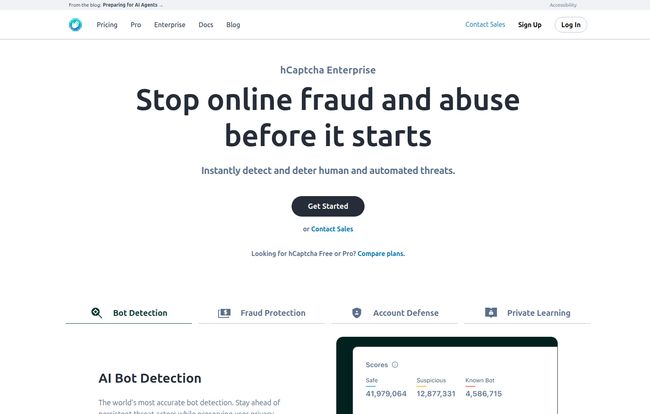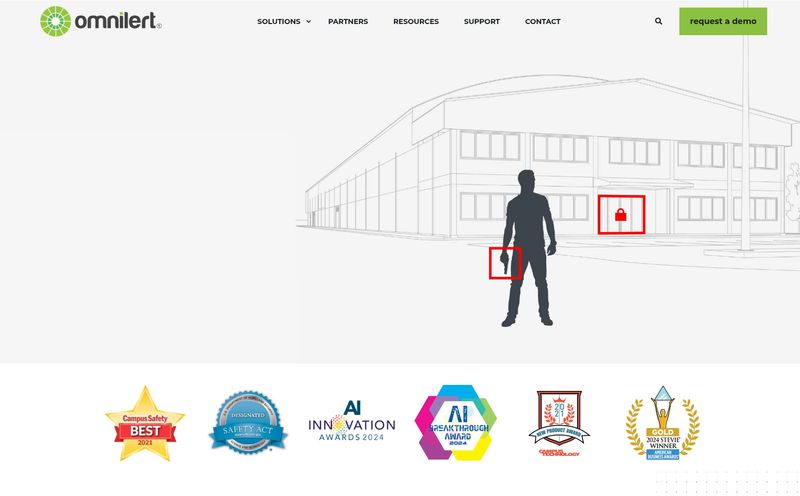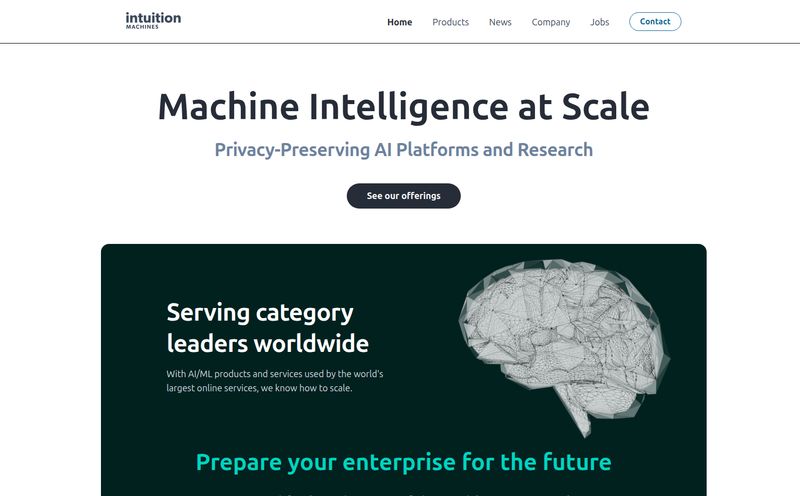Nobody likes CAPTCHAs. That moment when you're trying to log in, and suddenly you're forced to prove your humanity by identifying every single traffic light in a grainy, low-res image… it’s a special kind of digital purgatory. For years, we've just accepted it as a necessary evil. Google's reCAPTCHA became the default gatekeeper of the internet, the undisputed king of the “I’m not a robot” checkbox.
But what if it didn't have to be that way? What if there was a bouncer for your website who was just as tough on troublemakers but infinitely more respectful of your visitors' privacy? I’ve been in the SEO and traffic generation game for a long time, and I've watched bots evolve from simple spam scripts into sophisticated armies that can cripple a business. We need protection. But at what cost?
Lately, a challenger has been getting a lot of attention, and for good reason. It's called hCaptcha, and it’s making a pretty bold claim: enterprise-grade security with a rock-solid focus on privacy. I was skeptical at first, but after digging in, I’m starting to think they might just be right.
So, What Exactly is hCaptcha and Why Should I Care?
At its core, hCaptcha is an AI-powered security platform designed to do one thing really well: tell humans and malicious bots apart. It's a direct competitor to reCAPTCHA, but it approaches the problem from a completely different angle. Think of it this way: Google's reCAPTCHA is a bit like a bouncer who not only checks your ID but also follows you around the club, taking notes on what you drink and who you talk to. It learns about you, your browsing habits, everything. That's how it works. It leverages its massive data-collection empire to assess risk.
hCaptcha, on the other hand, is the bouncer who just wants to see if you’re on the list. It doesn't care about your personal life. Its entire model is built around a concept they call “Private Learning,” which allows it to provide top-tier abuse detection without collecting Personally Identifiable Information (PII). This isn’t just a minor feature; it’s their entire philosophy. In an age of GDPR, CCPA, and general user anxiety about data privacy, that’s a massive deal.

Visit hCaptcha
The Never-Ending Battle Against Malicious Bots
Why do we even need these tools? Because the internet is a battlefield, whether you realize it or not. Bad actors are constantly deploying bots to wreak havoc. We're talking about stuff like:
- Credential Stuffing: Bots trying thousands of stolen username/password combos to break into user accounts.
- Account Takeover (ATO): The end-goal of credential stuffing, leading to stolen data and fraud.
- Card Testing & Purchase Fraud: Bots making tiny purchases to see if stolen credit card numbers are valid. A nightmare for e-commerce sites.
- Spam & Content Abuse: Flooding your comments sections or forms with garbage.
hCaptcha is built to stand in the way of all of it. It’s not just a simple CAPTCHA; it’s a comprehensive security shield designed for the modern web. It protects the front door, the back door, and all the windows.
A Look Under the Hood at hCaptcha's Features
When you start looking at the feature list, you see this isn't just a simple checkbox replacement. One of the biggest wins, in my opinion, is its Passive (No-CAPTCHA) Mode. This is the holy grail. The system can analyze risk signals behind the scenes and let most of your legitimate users sail through without ever seeing a challenge. Less friction for users means better conversion rates. And that’s something every business owner or marketer can get excited about.
For the tougher cases, their AI-driven challenges are designed to be more effective and less annoying. But the real magic is that Private Learning AI. The system gets smarter over time without compromising user data. They also provide detailed risk scoring, advanced analytics, and features specifically to mitigate Advanced Persistent Threats (APTs), which is serious stuff usually reserved for the big leagues.
Let's Talk Money: hCaptcha Pricing
Okay, so it sounds great, but what's it going to cost me? This is where hCaptcha scores some major points. Their pricing is transparent and, frankly, very competitive. They've structured it in a way that’s accessible to almost everyone.
| Plan | Price | Best For |
|---|---|---|
| Basic | Free | Small websites, blogs, and anyone wanting to get started with solid bot protection without a budget. |
| Pro | $99/month (billed annually) | Growing businesses and sites that need a more frictionless experience and custom themes. Includes 100K evaluations per month. |
| Enterprise | Talk to Sales | Large-scale operations needing the full suite of features like advanced risk scores, passive mode, and enterprise-level support. |
The existence of a powerful free tier is fantastic. It lowers the barrier to entry to almost zero. For just under a hundred bucks a month, the Pro plan offers incredible value for most small to medium businesses.
The Good, The Bad, and The Realistic
No tool is perfect, so let’s get real. What I genuinely like about hCaptcha is its unwavering focus on privacy. It feels like a product built for the internet we want, not just the one we have. The accuracy is reportedly top-notch, and the commitment to accessibility (it’s WCAG 2.1 compliant) is a thoughtful and important touch.
But it's not all sunshine and rainbows. The main downside some might find is that the most powerful features, like the truly invisible Passive Mode and advanced threat mitigation, are locked away in the Enterprise plan. And yes, for that you have to do the classic “Talk to Sales” dance, which can be a bit of a drag when you just want a price. There can also be a bit of a learning curve if you want to create highly customized threat models, but for most users, the out-of-the-box setup is more than enough.
Who is hCaptcha Actually For?
So, should you make the switch? If you're running an eCommerce store and are bleeding money from card testing bots, absolutely. If you're a SaaS company worried about account takeovers, it’s a no-brainer to evaluate. Even if you're just a publisher who is sick of spam and respects your users' privacy, the free plan is an incredible starting point.
In my experience, any business that takes user trust seriously should be looking at alternatives to Google's ecosystem. hCaptcha presents one of the most compelling arguments I've seen in years. Its' a tool that aligns with a more ethical, privacy-conscious web.
Time to Ditch Google?
Making the move away from a default tool like reCAPTCHA can feel daunting. It’s familiar. It's easy. But “easy” isn’t always “best.” hCaptcha offers a path to better security, a superior user experience (when configured properly), and a clear conscience about user data. It proves that you don't have to choose between safety and privacy.
For me, the choice is becoming clearer every day. The web is evolving, and our tools need to evolve with it. hCaptcha feels less like just another tool and more like a statement about the kind of internet we want to build. One that's both secure and respectful.
Frequently Asked Questions about hCaptcha
- Is hCaptcha really free?
- Yes! There is a Basic plan that is completely free and offers world-class bot protection. It's a perfect starting point for most websites and applications.
- Is hCaptcha better than reCAPTCHA?
- "Better" depends on your priorities. If user privacy is a major concern for you, then hCaptcha has a significant advantage as it's designed to be privacy-first and compliant with GDPR, CCPA, etc. In terms of security, it's considered a top-tier, enterprise-grade solution.
- How difficult is it to set up hCaptcha?
- It's designed to be a drop-in replacement for reCAPTCHA, so the integration process is generally straightforward. They provide easy-to-follow documentation and support for various platforms, making the switch relatively painless for developers.
- Does hCaptcha work in countries where Google is blocked?
- Yes, it does. Since hCaptcha doesn't rely on Google's services, it's a reliable option for global applications that need to provide a consistent experience for users in all regions, including those where Google's services may be unavailable.
- What is "Passive Mode"?
- Passive Mode is a feature, typically in the Enterprise plan, that allows hCaptcha to assess a user's risk without showing them a puzzle or challenge. Most of your legitimate users will never even know it's there, which dramatically improves the user experience.



